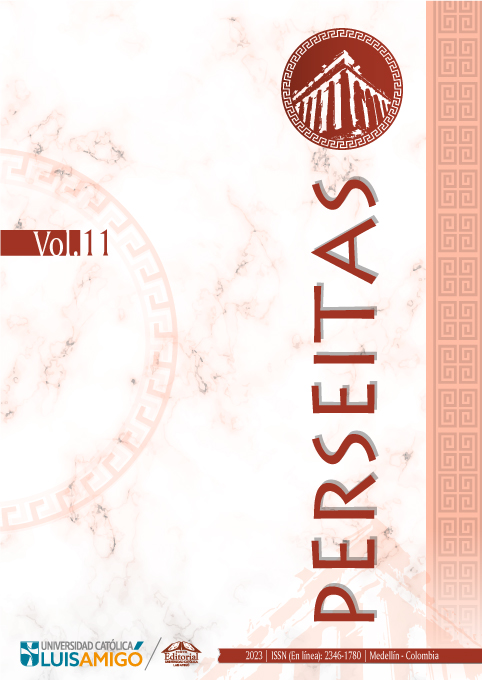The Apocalypse, a book of social resistance: ethical and moral contributions
DOI:
https://doi.org/10.21501/23461780.4358Keywords:
Apocalypse, Christian ethics, Freedom, Human dignity, Power, Social resistance, TotalitarianismAbstract
The present work aims to rescue the resistance and criticism of the Roman imperial power of the book of Revelation as a fundamental source for Christian moral theology, becoming a focus of light that illuminates the path of human conduct towards a better world. At the same time, it offers guidelines for the defense of life in an environment where political, economic, and religious totalitarianism threaten it. Furthermore, it aims to highlight such resistance and criticism as one of the generating factors, and therefore central, of the theology of the Apocalypse. For this purpose, the methodological principles of contextual reading will be used, based on the conviction that the text is an expression of the hagiographer’s community experiences and his attitude toward the social circumstances that provoked it. The book seeks to affect the environment, but this also shapes the content of the written work. In a second moment, the method seeks to investigate what of that historical moment can illuminate the reader’s present. In the case of the Apocalypse, texts will be chosen where the author presents the main themes and actors of the plot, namely: the supreme being seated on the throne, the lamb, and evil, specifically symbolized in the third horseman, since the message of the book is at stake in them, the humanizing divine sovereignty or the dehumanizing diabolical sovereignty.
Downloads
References
Alegre, X. S. (2013). La figura de Jesús en el Apocalipsis. Revista Latinoamericana de teología, (88), 3−28. https://doi.org/10.51378/rlt.v29i88.4677
Álvarez, A. (2017). El libro del apocalipsis. Las palabras y los días. PPC Editorial.
Arens, E. & Díaz M. (2000). Apocalipsis la fuerza de la esperanza. Estudio, lectura y comentario. Centro de Estudios y Publicaciones (CEP).
Arens, E., Diaz, M., & Kraft, T. (2005). Apocalipsis. En W. R. Farmer, A. J. Levoratti, S. McEvenue & D. L. Dungan (Eds.), Comentario bíblico internacional: Comentario católico y ecuménico para el siglo XXI (4ª ed.) (pp. 1244−1307). Verbo Divino.
Barco, J. (2017). El Apocalipsis de Juan: aspectos generales en cuanto a su simbología. Krónos Teológico, 9(9), 36−53. https://kronosteologico.unibautista.edu.co/index.php?journal=KT&page=article&op=view&path%5B%5D=64&path%5B%5D=54
Barco, J., & Zambrano D. (2018). Violencia y cultura de muerte en el Apocalipsis de Juan. Krónos Teológico, 10(10), 84−115. https://kronosteologico.unibautista.edu.co/index.php?journal=KT&page=article&op=view&path%5B%5D=77&path%5B%5D=63
Bernabé, C. (2010). Así empezó el cristianismo. El Apocalipsis: una teología política de la resistencia activa no violenta. Verbo Divino.
Biguzzi, G. (2005). Apocalipsse [Apocalipsis]. Paoline.
Brown, R. (2002). Introducción al Nuevo Testamento, Tomo II (A. Piñero, Trad.). Trotta. (Obra original publicada en 1997)
Cárdenas, Y. G. (2018). Las vestiduras blancas del Apocalipsis. Reflexiones Teológicas, (14), 1−16.
Casas, J. A. (2020). La venganza de Dios..., enjugar las lágrimas de los oprimidos. Una lectura de Apocalipsis 6,10. En E. Eslava (Comp.), Perdón, compasión y esperanza (pp. 53−66). Universidad de la Sabana.
Del Olmo, R. (2011). El culto al emperador. Religión y cultura, (256), 83−116.
Francisco. (2014). Exhortación Apostólica Evangelii Gaudium. Paulinas.
Gaitán, T. & Jaillier, C. (2014). Apocalipsis: Fe y Resistencia. Cuestiones Teológicas, 41(95), 97−131. https://revistas.upb.edu.co/index.php/cuestiones/article/view/349
Gaitán, T. (2018). El canto de Moisés y del Cordero (Ap. 15,3-4). Cantar y celebrar desde los márgenes de la cultura. Theologica Xaveriana, 68(186), 1−26. https://doi.org/10.11144/javeriana.tx68-186.cmcc
González Higuera, S., Colmenares Vargas, J. C., & Ramírez Sánchez Vargas, V. (2011). La resistencia social: una resistencia para la paz. Hallazgos, 8(15), 237−254.
Guijarro, S. (2017). La aportación del análisis contextual a la exégesis de los textos bíblicos. Cuestiones Teológicas, 44(102), 283−300. https://doi.org/10.18566/cueteo.v44n102.a04
Hawkin, D. (2003). The Critique of Ideology in the Book of Revelation and its Implications for Ecology [La crítica de la ideología en el libro del Apocalipsis y sus implicaciones en la ecología]. Journal for the Study of Religion, Nature and Culture, 8(2), 161−172. https://doi.org/10.1558/ecotheology.v8i2.161
Korner, R. (2000). "And I saw…" An Apocalyptic Literary Convention for Structural Identification in the Apocalypse ["Y yo vi..." Una convención literaria apocalíptica para una identificación estructural en el Apocalipsis]. Novum Testamentum, 42(2), 160−183. https://www.jstor.org/stable/1561330
Kotecki, D. (2008). Reinterpretación del Antiguo Testamento en el Nuevo: Cristología Teocéntrica en el Apocalipsis de san Juan. Scripta Theologica, 40, 509−524. https://doi.org/10.15581/006.40.10655
Mueller, E. (2021). Creation and the Gospel in the Three-Angels’ Message [Creación y el Evangelio en el mensaje de los tres ángeles]. DavarLogos, XX(1), 31−84. https://publicaciones.uap.edu.ar/index.php/davarlogos/article/view/975/927
Muñoz, D. (2007). Apocalipsis, comentarios a la nueva Biblia de Jerusalen. Descleé de Brouwer.
Nueva Biblia de Jerusalén. (1990). Desclée de Brouwer.
Pablo VI. (2000). Constitución dogmática Dei Verbum sobre la divina revelación. Vaticano. https://www.vatican.va/archive/hist_councils/ii_vatican_council/documents/vat-ii_const_19651118_dei-verbum_sp.
Pereira, M. (2015). Análisis de la simbólica apocalíptica en el arte: Los cuatro jinetes. Horizonte de la Ciencia, 5(9), 103−124. https://revistas.uncp.edu.pe/index.php/horizontedelaciencia/article/view/262
Pikaza, X. (2000). Apocalipsis. Verbo Divino.
Richard, P. (2000). Apocalipsis, reconstrucción de la esperanza. Verbo divino.
Rojas, I. (2013). Qué se sabe de los símbolos del Apocalipsis. Verbo Divino.
Schickendantz, C. (2004). El Curso fundamental de la fe de Karl Rahner. Objetivo, génesis y significado de un experimento. Teología y Vida, 45(1),137−156.
Schüssler, E. (1997). Apocalipsis, visión de un mundo justo (V. Morlá, Trad.). Verbo Divino. (Obra original publicada en 1992)
Sendoya, L. M. (2004). Ciencia y teología Aproximación epistemológica desde el sentido. Theologica Xaveriana, (150), 299−316. https://revistas.javeriana.edu.co/index.php/teoxaveriana/article/view/20202
Skaggs, R. (2020). Lion and Lamb in the Apocalypse of John [León y cordero en el Apocalipsis de Juan]. Academia Letters, 1−11. https://doi.org/10.20935/AL87
Vanni, U. (2019). Lectura del apocalipsis. Hermenéutica, exégesis y teología (H. Rey, Trad.). Verbo Divino. (Obra original publicada en 2005)
Published
How to Cite
Issue
Section
License

This work is licensed under a Creative Commons Attribution-NonCommercial-NoDerivatives 4.0 International License.
La revista y los textos individuales que en esta se divulgan están protegidos por las leyes de copyright y por los términos y condiciones de la Licencia Creative Commons Atribución-No Comercial-Sin Derivar 4.0 Internacional.
















